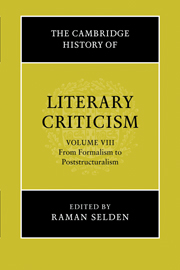Book contents
- Frontmatter
- Introduction
- 1 Russian Formalism
- STRUCTURALISM: ITS RISE, INFLUENCE AND AFTERMATH
- READER-ORIENTED THEORIES OF INTERPRETATION
- 9 Hermeneutics
- 10 Phenomenology
- 11 Reception theory: School of Constance
- 12 Speech act theory and literary studies
- 13 Other reader-oriented theories
- Bibliography
- Index
- References
9 - Hermeneutics
from READER-ORIENTED THEORIES OF INTERPRETATION
Published online by Cambridge University Press: 28 March 2008
- Frontmatter
- Introduction
- 1 Russian Formalism
- STRUCTURALISM: ITS RISE, INFLUENCE AND AFTERMATH
- READER-ORIENTED THEORIES OF INTERPRETATION
- 9 Hermeneutics
- 10 Phenomenology
- 11 Reception theory: School of Constance
- 12 Speech act theory and literary studies
- 13 Other reader-oriented theories
- Bibliography
- Index
- References
Summary
Introduction
The Greek God Hermes, credited with the invention of both language and writing, lies somewhere at the origin of the word ‘hermeneutics’. As messenger of the gods, it was his task to communicate the divine word to mortals, thus mediating between Olympus and the sphere of human activity. The Greek verb hermeneuein, which means ‘to say’, ‘to explain’, or ‘to translate’, and the noun hermeneia, ‘explanation’ or ‘interpretation’, already map out the field of meaning hermeneutics would later assume. Of central importance for the Greek and for the modern sense of the term is the bringing to understanding of something obscure or foreign, the translation of the unfamiliar into a comprehensible form. In its most basic form hermeneutics has to do with mediation of understanding, and for this reason the ‘art of interpretation’ has been most often discussed and developed when meanings have been or become unclear. Although it has traditionally involved the method for dealing with textual artefacts of the past, in the twentieth century hermeneutics has been associated with more general philosophical considerations, especially in the realm of ontology. Rather than developing rules for the exegesis of written material, hermeneutically oriented theories for the past century have emphasized understanding as a basic orientation for our being-in-the-world.
Prior to the romantic era the tasks of hermeneutics were rather well defined and confined to three central areas. Perhaps the longest continuous hermeneutic tradition involves Biblical exegesis. It can be traced back to Old Testament times, when rules were developed for the correct interpretation of the Torah.
- Type
- Chapter
- Information
- The Cambridge History of Literary Criticism , pp. 253 - 288Publisher: Cambridge University PressPrint publication year: 1995



